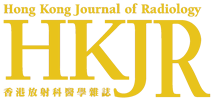Side Effects of High-dose Radioactive Iodine for Ablation or Treatment of Differentiated Thyroid Carcinoma
SM Chow
Hong Kong J Radiol 2005;8:127-35
Iodine-131 or radioactive iodine benefits patients with differentiated thyroid carcinoma by treating recurrences and in reducing relapses after operation. Postoperative ablation of thyroid remnants facilitates follow-up by serial monitoring of serum thyroglobulin. The clinical benefits of reducing recurrences are well documented in many retrospective studies. Recently, a systematic review and meta-analysis showed a positive role of radioactive iodine ablation in patients with postoperative adjuvant radioactive iodine ablation. A pooled reduction of 10-year locoregional recurrence risk to 0.31 and an absolute reduction in distant metastasis of 3% were documented. While the use of radioactive iodine is becoming more prevalent, information about side effects is important in patient management. Acute side effects are usually mild and well tolerated. Organspecific side effects such as damage to salivary glands, bone marrow and gonads are usually mild and reversible. However, these dose-dependent side effects may become permanent with repeated doses. Radiation pneumonitis and lung fibrosis is rarely observed nowadays. Effects on fertility, secondary solid tumours and leukaemias are also reviewed. From the current literature, radioactive iodine is a safe treatment modality, provided that the precautions are well observed.

